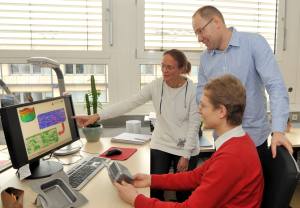Since October 2008, Karlsruhe Institute of Technology (KIT) and the Karlsruhe University of Applied Sciences have been running a joint research training group. When established, this group was the only joint education program for Ph. D. students of a University of Applied Sciences and a university in Germany, which was funded by the German Research Foundation (DFG). Today, only two of such groups exist. Now, the results achieved so far and plans for the future have convinced the reviewers. The DFG has decided to fund the research training group with EUR 6 million for another 4.5 years.
“The research training group combines computer technology with materials science and production technology,” explains the spokesman of the research training group, Professor Volker Schulze from KIT. Schulze is spokesperson of the board of the Institute of Production Science (wbk) and member of the board of the Institute for Applied Materials. He attaches particular value to the interdisciplinary character of the research training group. Deputy Spokesperson of the Research Training Group Professor Britta Nestler conducts research at the Institute of Materials and Processes and teaches materials simulation at KIT and informatics at the University of Applied Sciences. She describes the central idea of the group called “Prozessketten in der Fertigung: Wechselwirkung, Modellbildung und Bewertung von Prozesszonen” (Process Chains in Manufacture: Interactions, Modeling, and Evaluation of Process Zones): “We are developing simulation methods to describe, evaluate, and optimize the states of components in production process chains.” In the past years, importance of computer-based simulation in production technology increased constantly. Advantages mainly result from the reduction of high-expenditure experimental investigations for the optimum control of production processes and determination of product properties. “As a result, development times of new products can be reduced considerably. This promises to result in enormous competitive advantages in production technology,” says the researcher.
“This success of the joint research training group again demonstrates how well research resources in Karlsruhe can be used to extensively support young scientists,” says KIT Vice President for Research and Information, Professor Detlef Löhe. “The strengths of the research training group are its interdisciplinary approach, the excellent infrastructure, and the outstanding cooperation of renowned scientists of KIT and the Karlsruhe University of Applied Sciences.”
Professor Karl-Heinz Meisel, Rector of the Karlsruhe University of Applied Sciences, adds: “Via this research training group, we can offer high-quality PhD positions to excellent master students without them having to pass a time-consuming procedure for determining their qualification for a doctorate.” The high scientific level of the institutions running the research training group was confirmed by the DFG accepting our proposal. “This also shows the high scientific level that can be reached by research and education at a university of applied sciences,” continues the Rector.
Since 2008, 14 PhD students and two post-docs have joined the research training group. The doctoral students are supervised by seven internationally renowned professors and five excellent young scientists. Funding until 2017 will allow another 26 doctoral students to join the program, four of them will attend the program at the Karlsruhe University of Applied Sciences.
Apart from institutes of KIT and the University of Applied Sciences, the Fraunhofer Institute for Mechanics of Materials, Freiburg, takes part in the project. Other partners are the Institute for Metal Forming Technology of the University of Stuttgart and the Institute for Forming Technology and Lightweight Construction of Universität Dortmund.
With 7625 students Karlsruhe University of Applied Sciences is one of the biggest universities of applied sciences in Baden-Württemberg. In addition to education, it focuses mainly on applied research. It is among the state’s universities of applied sciences that are strongest in acquiring third-party funding and cooperates closely with regional and supraregional industry.
Being “The Research University in the Helmholtz Association”, KIT creates and imparts knowledge for the society and the environment. It is the objective to make significant contributions to the global challenges in the fields of energy, mobility, and information. For this, about 10,000 employees cooperate in a broad range of disciplines in natural sciences, engineering sciences, economics, and the humanities and social sciences. KIT prepares its 22,800 students for responsible tasks in society, industry, and science by offering research-based study programs. Innovation efforts at KIT build a bridge between important scientific findings and their application for the benefit of society, economic prosperity, and the preservation of our natural basis of life. KIT is one of the German universities of excellence.

